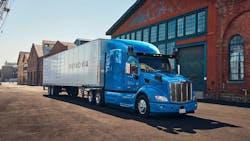Waymo Via, the delivery side of Alphabet’s self-driving vehicle business, has commenced Class 8 truck testing out of the Dallas-Fort Wort area, with runs to El Paso using Interstates 20 and 10, as well as to Houston by way of Interstate 45. Drivers of the Peterbilt 579 trucks, which are outfitted with an array of Waymo Driver sensors and cameras, will first manually drive the routes and after that the autonomous software take over.
“Dallas and Houston are known to be part of the biggest freight hubs in the U.S.,” explained a Waymo spokesperson via email. “Operating in that environment, we can test our Waymo Driver on highly dense highways and shipping lanes, further understand how other truck and passenger car drivers behave on these routes, and continue to refine the way our Waymo Driver reacts and responds in these busy driving regions.”
The Waymo Driver platform has so far accrued 20 million miles driven on public roads across more than 25 cities, and the artificial intelligence technology has done another 15 billion miles in simulation.
Texas and trucking are near synonymous, as one in 16 residents of the Lonestar State are in the trucking industry, helping move 1.2 billion tons of freight (worth $1.6 trillion) annually, according to the Texas Department of Transportation. The U.S. 2019 GDP was $21.4 trillion. Waymo contends that its autonomous solution will ensure the industry’s vitality in the region.
“We are trying to enable this thriving industry with the Waymo Driver, not disrupt it,” the spokesperson said. “We believe our technology can help alleviate the strain on the industry that exists today due to the rising driver shortage and the challenges that come with trying to recruit and retain drivers.”
Waymo and its driver expertise partner Transdev are currently hiring CDL test drivers.
While many question how a robot can be a better driver than human when so many variables exist on the road, Waymo points to the rising number of truck-related fatalities.
“Fatalities from large truck crashes have been increasing over the decade, while the overall crash fatalities have decreased during that period,” said Vijaysai Patnaik, Waymo Via trucking product lead, on a June media call. “So our goal really is to improve the safety on the road by making every mile traveled with Waymo Driver safer, because it doesn't get tired or distracted.”
Waymo believes that self-driving trucks will at some point also be able to improve low utilization rates associated with human drivers, who need to take breaks and eat and sleep. Overall, the spokesperson noted the technology “can help minimize fleet downtime and reduce incidents on the road, lower insurance costs, and help ensure shipments arrive safely, securely and on-time.”
Waymo has raised more than $3 billion in its first external funding round, and the ultimate goal is to integrate trucks with the Driver sensors and cameras at the OEM-level and offer freight services to fleets.
About the Author
John Hitch
Editor
John Hitch is the editor-in-chief of Fleet Maintenance, providing maintenance management and technicians with the the latest information on the tools and strategies to keep their fleets' commercial vehicles moving. He is based out of Cleveland, Ohio, and was previously senior editor for FleetOwner. He previously wrote about manufacturing and advanced technology for IndustryWeek and New Equipment Digest.


